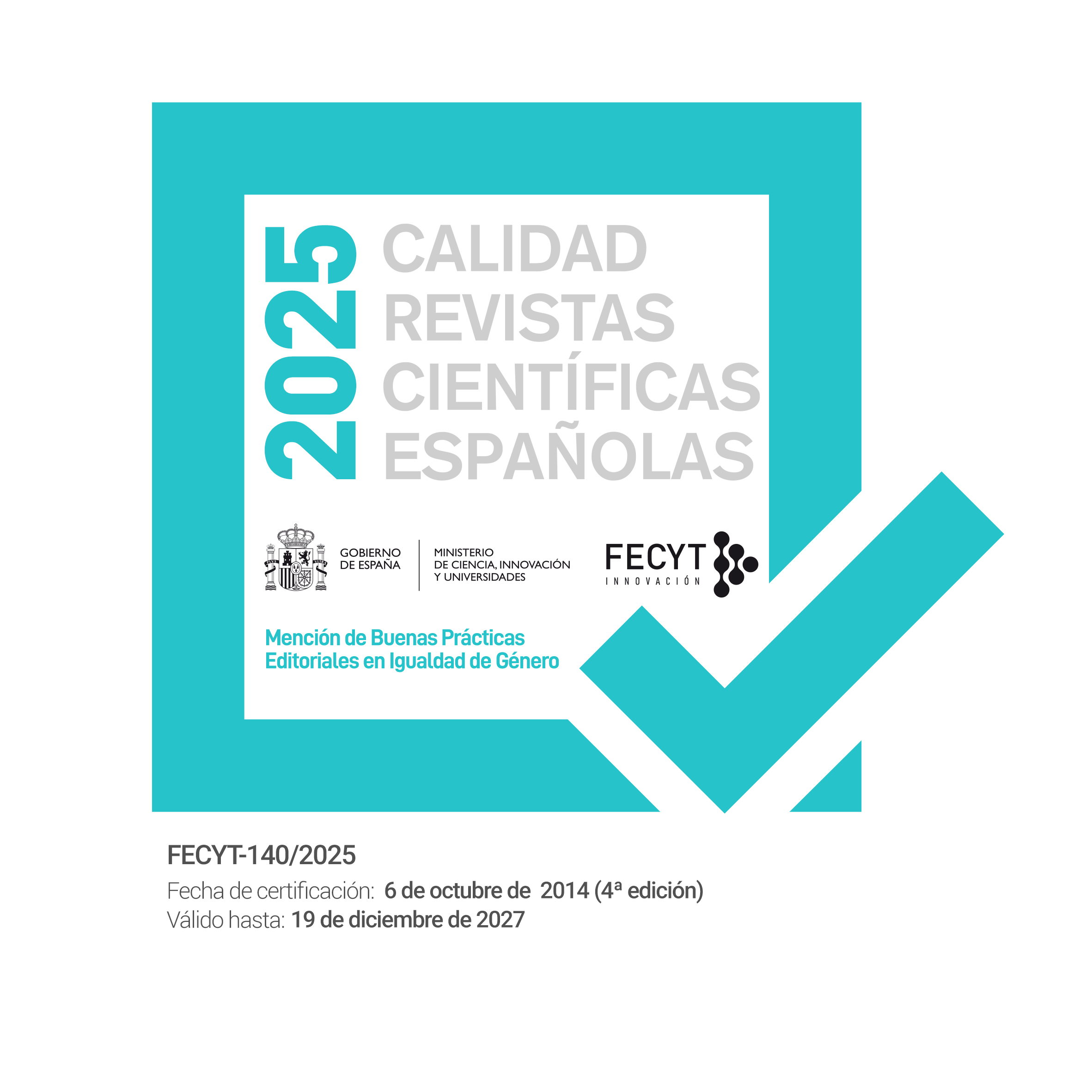Flexible and rigid persistence: Relations with passion, vitality, and intention to stay in university teachers
DOI:
https://doi.org/10.5944/educxx1.34646Keywords:
passion, persistence, university teachers, intention to stay, subjetive vitalityAbstract
Passion and persistence are related constructs that have been perceived as key qualities for people to achieve their aims. While passion has been widely analyzed from a dualistic position, studies on persistence have rarely been focused on persistence regarding its quality. Thus, the aim of this study was twofold. Firstly, it aimed to analyze the relationships between flexible and rigid persistence, harmonious and obsessive passion, subjective vitality, and intention to stay in a sample of 201 university teachers from 20 universities. The secondary goal was to translate and assess the psychometric properties of the Spanish version of the Flexible and Rigid Persistence Scale. Overall, the findings supported the hypotheses tested. Regarding the first aim, we tested a structural equation model in which we hypothesized that harmonious passion would positively lead to flexible persistence and, to a lesser degree, to rigid persistence, and that obsessive passion would positively predict rigid persistence and negatively predict flexible persistence. In turn, both types of persistence would predict intention to continue teaching (activity outcome), but only flexible persistence would predict subjective vitality (life outcome). As expected, the structural equation model showed that harmonious passion for teaching predicted flexible persistence, while obsessive passion for teaching predicted rigid persistence and it was negatively related to flexible persistence. In turn, only flexible persistence predicted subjective vitality and intention to keep on teaching. Regarding the second goal of the study, results from exploratory structural equation modeling, reliability analysis, and multi-group exploratory structural equation modeling supported the psychometric properties of the Spanish version of the scale in the educational context for university teachers. These results are partially consistent with those reported in the original version, and they lead to new research on the role of passion and persistence in education.
Downloads
References
Anderson, J. C., & Gerbing, D. W. (1988). Structural equation modeling in practice: A review and recommended two-step approach. Psychological Bulletin, 103, 411–423. https://doi.org/10.1037/0033-2909.103.3.411
Asparouhov, T., & Muthén, B. O. (2009). Exploratory structural equation modeling. Structural Equation Modeling: A Multidisciplinary Journal, 16(3), 397–438. https://doi.org/10.1080/10705510903008204
Asparouhov, T., & Muthén, B. O. (2010). Weighted least squares estimation with missing data. https://cutt.ly/C88QyXQ
Balaguer, I., Castillo, I., García-Merita, M., & Mars, L. (2005). Implications of structured extracurricular activities on adolescent’s well-being and risk behaviours: Motivational mechanisms [Paper Presentation]. 9th European Congress of Psychology, Granada, Spain.
Bonanomi, A., Cantaluppi, G., Nai Ruscone, M., & Osmetti, S. A. (2015). A new estimator of Zumbo’s Ordinal Alpha: A copula approach. Quality and Quantity, 49(3), 941–953. https://doi.org/10.1007/s11135-014-0114-8
Bonneville-Roussy, A., Lavigne, G. L., & Vallerand, R. J. (2011). When passion leads to excellence: The case of musicians. Psychology of Music, 39(1), 123–138. https://doi.org/10.1177/0305735609352441
Bonneville-Roussy, A., Vallerand, R. J., & Bouffard, T. (2013). The roles of autonomy support and harmonious and obsessive passions in educational persistence. Learning and Individual Differences, 24, 22–31. https://doi.org/10.1016/j.lindif.2012.12.015
Bouizegarene, N., Bourdeau, S., Leduc, C., Gousse-Lessard, A.-S., Houlfort, N., & Vallerand, R. J. (2017). We are our passions: The role of identity processes in harmonious and obsessive passion and links to optimal functioning in society. Self and Identity, 17(1), 1–19. https://doi.org/10.1080/15298868.2017.1321038
Brandtstädter, J. (2009). Goal pursuit and goal adjustment: Self-regulation and intentional self-development in changing developmental contexts. Advances in Life Course Research, 14(1–2), 52–62. https://doi.org/10.1016/j.alcr.2009.03.002
Byrne, B. M. (2012). Structural equation modeling with Mplus: Basic concepts, applications and programming. Routledge. https://doi.org/10.4324/9780203807644
Cardon, M. S., & Kirk, C. P. (2015). Entrepreneurial passion as mediator of the self-efficacy to persistence relationship. Entrepreneurship Theory and Practice, 39(5), 1027–1050. https://doi.org/10.1111/etap.12089
Carpentier, J., Mageau, G. A., & Vallerand, R. J. (2012). Ruminations and flow: Why do people with a more harmonious passion experience higher well-being? Journal of Happiness Studies, 13(3), 501–518. https://doi.org/10.1007/s10902-011-9276-4
Chamarro, A., Penelo, E., Fomieles, A., Obersrt, Ú., Vallerand, R. J., & Fernández-Castro, J. (2015). Psychometric properties of the Spanish version of the Passion Scale. Psicothema, 27(4), 2–409.
Cheung, G. W., & Rensvold, R. B. (2002). Evaluating goodness-of-fit indexes for testing measurement invariance. Structural Equation Modeling, 9, 233–255. https://doi.org/10.1207/S15328007SEM0902_5
Chichekian, T., & Vallerand, R. J. (2022). Passion for science and the pursuit of scientific studies: The mediating role of rigid and flexible persistence and activity involvement. Learning and Individual Differences. https://doi.org/10.1016/j.lindif.2021.102104
Credé, M., Tynan, C., & Harms, P. (2016). Much ado about grit: A meta-analytic synthesis of the grit literature. Journal of Personality and Social Psychology, 113(3), 492–511. https://cutt.ly/488WqW1
Donahue, E. G., Rip, B., & Vallerand, R. J. (2009). When winning is everything: On passion, identity, and aggression in sport. Psychology of Sport and Exercise, 10(5), 526–534. https://doi.org/10.1016/j.psychsport.2009.02.002
Duckworth, A L, Peterson, C., Matthews, M. D., & Kelly, D. R. (2007). Grit: Perseverance and passion for long-term goals. Journal of Personality and Social Psychology, 92, 1087–1101. https://doi.org/10.1037/0022-3514.92.6.1087
Duckworth, Angela Lee, Kirby, T. A., Tsukayama, E., Berstein, H., & Ericsson, K. A. (2011). Deliberate practice spells success: Why grittier competitors triumph at the National Spelling Bee. Social Psychological and Personality Science, 2(2), 174–181. https://doi.org/10.1177/1948550610385872
Elosua, P., & Zumbo, B. D. (2008). Reliability coefficients for ordinal response scales. Psicothema, 20(4), 896–901. https://cutt.ly/E88Wipe
Feng, B., & Chen, M. (2020). The impact of entrepreneurial passion on psychology and behavior of entrepreneurs. Frontiers in Psychology, 11(July), 1–14. https://doi.org/10.3389/fpsyg.2020.01733
Flora, D. B., & Curran, P. J. (2004). An empirical evaluation of alternative methods of estimation for confirmatory factor analysis with ordinal data. Psychological Methods, 9(4), 466–491. https://doi.org/10.1037/1082-989X.9.4.466
Gimeno, J., Folta, T. B., Cooper, A. C., & Woo, C. Y. (1997). Survival of the fittest? Entrepreneurial human capital and the persistence of underperforming firms. Administrative Science Quarterly, 42(4), 750–783. https://doi.org/10.2307/2393656
Hatch, D. K., & Garcia, C. E. (2017). Academic advising and the persistence intentions of community college students in their first weeks in college. Review of Higher Education 40(3), 353-390. https://doi.org/10.1353/rhe.2017.0012
Ho, V. T., Kong, D. T., Lee, C. H., Dubreuil, P., & Forest, J. (2018). Promoting harmonious work passion among unmotivated employees: A two-nation investigation of the compensatory function of cooperative psychological climate. Journal of Vocational Behavior, 106(January), 112–125. https://doi.org/10.1016/j.jvb.2018.01.005
Lafrenière, M. A. K., Bélanger, J. J., Sedikides, C., & Vallerand, R. J. (2011). Self-esteem and passion for activities. Personality and Individual Differences, 51(4), 541–544. https://doi.org/10.1016/j.paid.2011.04.017
Mageau, G. A., Vallerand, R. J., Rousseau, F. L., Ratelle, C. F., & Provencher, P. J. (2005). Passion and gambling: Investigating the divergent affective and cognitive consequences of gambling. Journal of Applied Social Psychology, 35(1), 100–118. https://doi.org/10.1111/j.1559-1816.2005.tb02095.x
Marsh, H. W., Vallerand, R. J., Lafreniere, M. A. K., Parker, P., Morin, A. J. S., Carbonneau, N., Jowett, S., Bureau, J. S., Fernet, C., Guay, F., Salah Abduljabbar, A., & Paquet, Y. (2013). Passion: Does one scale fit all? Construct validity of two-factor Passion Scale and psychometric invariance over different activities and languages. Psychological Assessment, 25, 796-809. https://doi.org/10.1037/a0032573
McNeish, D. M. (2017). Thanks coefficient alpha, we’ll take it from here. Psychological Methods, 23(3), 412–433. https://doi.org/10.1037/met0000144
Muñiz, J., Elosua, P., & Hambleton, R. K. (2013). Directrices para la traducción y adaptación de los tests: segunda edición. Psicothema, 25(2), 151–157. https://doi.org/10.7334/psicothema2013.24
Muñiz, J., & Fonseca-Pedrero (2019). Diez pasos para la construcción de un test. Psicothema, 31(1), 7-16. https://doi.org/10.7334/psicothema2018.291
Pascual-Gómez, I., & Arteaga-Martínez, B. (2020). La satisfacción personal y profesional del docende de secundaria: un análisis del rendimiento académico desde los datos de PISA 2015. Bordón - Revista de Pedagogía, 72(4), 79-93. https://doi.org/10.13042/BORDON.2020.79465
Revelle, W., & Zinbarg, R. E. (2009). Coefficients alpha, beta, omega, and the glb: Comments on Sijtsma. Psychometrika, 74(1), 145–154. https://doi.org/10.1007/s11336-008-9102-z
Robertson-Kraft, C., & Duckworth, A. L. (2014). True grit: Trait-level perseverance and passion for long-term goals predicts effectiveness and retention among novice teachers. Teachers College Record, 116(3), 1–27. https://doi.org/10.1177/016146811411600306
Rousseau, F. L., & Vallerand, R. J. (2003). Le rôle de la passion dans le bien-être subjectif des aînés. Québécoise de Psychologie, 24, 197–211.
Ryan, R. M., & Frederick, C. M. (1997). On Energy, personality, and health: Subjective vitality as a dynamic reflection of well-being. Journal of Personality and Social Psychology, 65, 529–565. https://doi.org/10.1111/j.1467-6494.1997.tb00326.x
Schellenberg, B., Verner-Filion, J., Gaudreau, P., Bailis, D., Lafrenière, M-A., & Vallerand, R. J. (2019). Testing the Dualistic Model of Passion using a novel quadripartite approach: A look at physical and psychological well-being. Journal of Personality, 87(2), 163-480. https://doi.org/10.1111/jopy.12378
Schmidt, F. T. C., Fleckenstein, J., Retelsdorf, J., Eskreis-Winkler, L., & Möller, J. (2017). Measuring grit: A German validation and a domain-specific approach to grit. European Journal of Psychological Assessment, 35(3), 436–447. https://doi.org/10.1027/1015-5759/a000407
Schmitt, T. A. (2011). Current methodological considerations in exploratory and confirmatory factor analysis. Journal of Psychoeducational Assessment, 29(4), 304–321. https://doi.org/10.1177/0734282911406653
Schneider, M., & Preckel, F. (2017). Variables associated with achievement in higher education: A systematic review of meta-analyses. Psychological Bulletin, 143(6), 565–600. https://doi.org/10.1037/bul0000098
St-Louis, A. C., Verner-Filion, J., Bergeron, C. M., & Vallerand, R. J. (2016). Passion and mindfulness: Accessing adaptive self-processes. The Journal of Positive Psychology, 13(2), 155–164. https://doi.org/10.1080/17439760.2016.1245771
Stoffel, J. M., & Cain, J. (2018). Review of grit and resilience literature within health professions education, American Journal of Pharmaceutical Education, 82(2) Artículo 6150. https://doi.org/10.5688/ajpe6150
Strayhorn, T. L. (2014). What role does grit play in the academic success of black male collegians at predominantly white institutions? Journal of African American Studies, 18(1), 1–10. https://doi.org/10.1007/s12111-012-9243-0
Vallerand, R.J. (1989). Vers une méthodologie de validation trans-culturelle de questionnaires psychologiques: Implications pour la recherche en langue française. Canadian Psychology, 30, 662-678. https://doi.org/10.1037/h0079856
Vallerand, R. J. (2015). The psychology of passion: A dualistic model. Oxford University Press. https://doi.org/10.1093/acprof:oso/9780199777600.001.0001
Vallerand, R. J., Blanchard, C. M., Mageau, G. A., Koestner, R., Ratelle, C. F., Leonard, M., Gagne, M., & Marsolais, J. (2003). Les passions de l’Ame: On obsessive and harmonious passion. Journal of Personality and Social Psychology, 85(4), 756–767. https://doi.org/10.1037/0022-3514.85.4.756
Vallerand, R. J., Chichekian, T., Verner-Filion, J., & Bélanger, J. (2022, submitted). On the role of rigid and flexible persistence in the activity and life outcomes of passionate individuals.
Vallerand, R. J., Fortier, M. S., & Guay, F. (1997). Self-determination and persistence in a real-life setting: Toward a motivational model of high school dropout. Journal of Personality and Social Psychology, 72(5), 1161–1176. https://cutt.ly/z88R2UF
Vallerand, R. J., Paquette, V., & Richard, C. (2022). The role of passion in psychological and cardiovascular responses: Extending the field of passion and positive psychology in new directions". Frontiers in Psychology, 12. https://doi.org/10.3389/fpsyg.2021.744629
Vallerand, R. J., Salvy, S. J., Mageau, G. A., Elliot, A. J., Denis, P. L., Grouzet, F. M. E., & Blanchard, C. M. (2007). On the role of passion in performance. Journal of Personality, 75(3), 505–534. https://doi.org/10.1111/j.1467-6494.2007.00447.x
Vandenberg, R. J., & Lance, C. E. (2000). A Review and synthesis of the measurement invariance literature: Suggestions, practices, and recommendations for organizational research. Organizational Research Methods, 3(1), 4–70. https://doi.org/10.1177/109442810031002
Wrosch, C., Scheier, M. F., Carver, C. S., & Schulz, R. (2003). The importance of goal disengagement in adaptive self-regulation: When giving up is beneficial. Self and Identity, 2(1), 1–20. https://doi.org/10.1080/15298860309021
Yang, Y., & Green, S. B. (2010). A note on structural equation modeling estimates of reliability. Structural Equation Modeling: A Multidisciplinary Journal, 17(1), 66–81. https://doi.org/10.1080/10705510903438963
Zhang, Z., & Yuan, K.-H. (2016). Robust coefficients alpha and omega and confidence intervals with outlying observations and missing data: Methods and software. Educational and Psychological Measurement, 76(3), 387–411. https://doi.org/10.1177/0013164415594658

Downloads
Published
How to Cite
Issue
Section
License
Copyright (c) 2023 Zuleica Ruiz-Alfonso, Rocío Pérez-Solís, Celia Fernández-Sarmiento, Robert J Vallerand

This work is licensed under a Creative Commons Attribution-NonCommercial 4.0 International License.
Educación XX1 is published under a Creative Commons Attribution-NonCommercial 4.0 (CC BY-NC 4.0)










